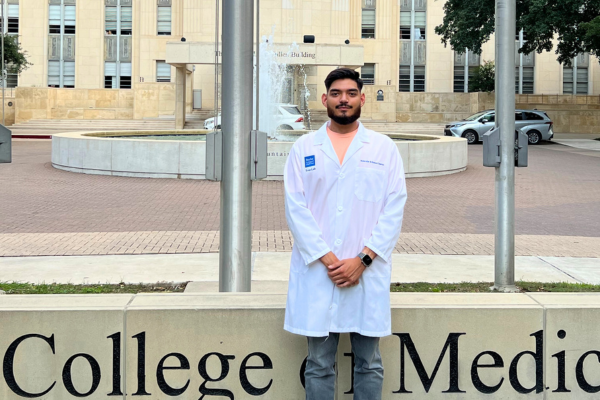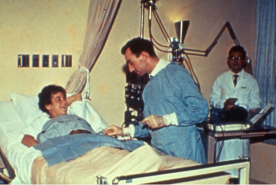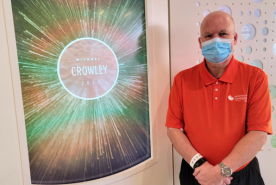March 11, 2025
A swollen face, a shocking blood pressure reading, and a rare kidney disease–at 17, Andrew Natera's life changed in ways he never imagined. His kidneys were failing. Instead of letting his diagnosis hold him back, Andrew used it as inspiration. Now in college, he's studying microbiology and immunology. He's determined to become a doctor and help others facing the same challenges.
Symptoms of Kidney Failure
Andrew noticed he was gaining weight during his senior year of high school in early 2022. He thought nothing of it and continued with daily life. He had no idea it was fluid building up due to his kidneys failing.
"One night, my face swelled up like a puffer fish. I thought it was allergies, so I took an antihistamine and went to bed," Andrew said. "My face was still swollen the next morning."
When Andrew's mother saw his face, she became immediately concerned.
"I tried to brush it off because I felt fine. But she took me to the E.R. The nurse took my blood pressure and was shocked at how high it was," Andrew said. "She thought the machine was broken and tried with another."
The results were the same. A doctor explained that something might be wrong with Andrew’s kidneys.
"I grew up in a small town. The hospital didn't have the resources to properly treat me," Andrew said. "I was airlifted to another hospital a few days later and admitted. I received diuretics, a medication that makes you urinate more, to help with the fluid overload."
Andrew's new healthcare team ran tests, including a kidney biopsy, to determine what was happening.
"It took a week. At first, my doctor was hopeful we could save my kidneys," Andrew said. "That changed after my kidney biopsy results came in."
A Rare Diagnosis
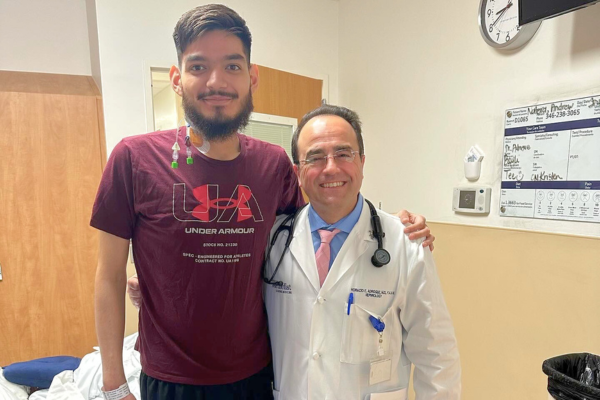
Andrew was diagnosed with Dense Deposit Disease (DDD). DDD occurs when part of the immune system, called complement, doesn't work correctly. The complement system is a group of proteins that help fight infections.
With this disease, the proteins don't work properly and break down in the kidneys. This buildup damages the kidney filters, making it harder for the body to remove waste.
"There is no cure, and my kidneys were already very damaged. They were only functioning at around 35 percent," Andrew said. "I would eventually need dialysis or a kidney transplant."
Andrew transferred to a hospital closer to home, where he worked with his doctor to try and maintain his kidney function with diet changes and immunosuppressant medications.
Treatments may help slow down damage from DDD:
- Steroids and immunosuppressants: Help calm the immune system.
- Blood pressure medicines: Help protect the kidneys.
- Diet changes: Less salt and protein may help.
Subscribe today!
Join the NKF Blog Newsletter
Get inspirational stories and kidney disease resources delivered to your inbox every month. You'll gain practical insights and expert advice to help you better understand and manage your kidney health no matter where you are on your kidney journey.
Getting a Transplant
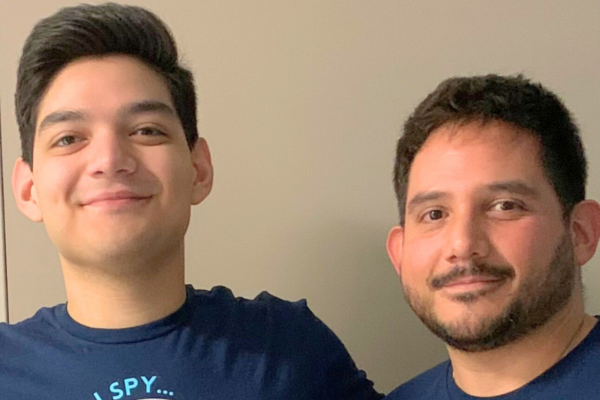
Andrew's kidney failed in October 2023.
"I started peritoneal dialysis, a home dialysis option. It uses the stomach lining and a sugar-based fluid to filter waste from your blood," Andrew said. "This option allowed me to continue going to school and live without too much interruption."
That didn't mean dialysis wasn't difficult.
"My peritoneal dialysis tube clogged frequently," said Andrew. "The machine beeped all night, and I struggled to sleep."
Luckily, Andrew didn't have to deal with dialysis for long.
"I got my transplant waitlist evaluation the same day my dad went through the living donor evaluation," Andrew said. "I'm so grateful my dad was my match and a good donor candidate."
Their transplant surgery took place on February 27th, 2024.
"I felt the difference as soon as I woke up. I had energy and felt alert. I was hungry for the first time in years," said Andrew. "My dad and I recovered very well."
Unfortunately, Andrew's creatinine, a waste product the kidneys usually remove, was high just two months after the transplant.
"The doctors thought it could be a sign of rejection. I had a feeling my disease had just come back," said Andrew. "They did a biopsy. A week later, my doctor confirmed my suspicion."
But Andrew's team wasn't about to give up on him now.
"My doctor got me approved for a clinical trial. I now get an injection of a complement inhibitor medication that helps suppress the complement system," Andrew said. "Since then, my numbers have been stable. My doctors are happy with my blood work."
NKF is here for you whether you need a kidney transplant or are considering donating one. Start your transplant education journey here.
The Next Generation
Andrew's kidney journey inspired him to start an undergraduate degree in microbiology and immunology.
"My journey is shaped by my experience with an immune disorder and kidney disease," said Andrew. "I want to help others living with similar issues."
While in school, Andrew had an internship that confirmed his passion for medicine.
"I split my time between kidney research and clinical work. This experience gave me a deeper understanding of research and patient care," Andrew said. "It confirmed my desire to dedicate my career to this. I will become a doctor so I can help others who face the same challenges."
Andrew credits his success to his family, friends, and healthcare team, who uplifted him when he was at his lowest.
"Living with kidney disease means constantly managing so many aspects of your health while worrying that your kidneys might fail someday," Andrew said. "It's important to have someone to lean on when you're feeling exhausted or overwhelmed. Talking to others during those tough times helped me keep going."
Struggling with kidney disease? NKF Peers are here to help! Get matched with a trained peer mentor who knows what it is like to live with kidney disease.
